Saida 4 September 2006
These interviews were conducted in Saida by Lens on Lebanon.
Name of interviewee: Jamal Bilbasi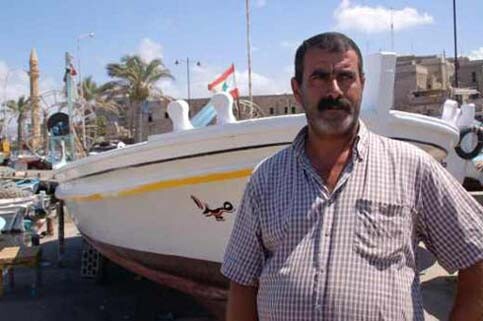
Jamal Bilbasi
Age: 48 years
Place of origin: Palestinian from Acre
Present address: Saida
Occupation: Fisherman
Name of interviewer: Mahmoud Zeidan
Q: Tell me how were you affected by the war?
A: We are mostly affected financially. We have no money to eat. This blockade is so hard for fishermen.
Q: What were you doing during war?
A: Nothing, we just woke up, came here to the port for chatting, then went back home to sleep. We sold the gold of our women to live. Yesterday one of our friends sold his TV to buy food. So far we got nothing. Nobody compensated us. We haven’t received anything after 51 days of blockade. We want to tell the American embassy that these poor people are living like this on a daily basis but done nothing to be treated this way. What have they done to be besieged? Fishermen in Tripoli and Jouneh are fishing, but from Ouzai to Tyre we are not allowed.
Q: Why don’t you go out to fish like them?
A: Israel will shoot at us. And the Lebanese army is preventing us for our safety.
Q: Where is the fish in the market coming from?
A: It’s from Abdeh on the Syrian-Tripoli borders.
Q: Have you experienced an attack by Israeli warships before?
A: Yes, in 1996 they shot at me, and people thought I had drowned.
Q: How do you compare the two blockades?
A: In 1996 it was only for 18 days, and we were compensated, but now it’s 51 days and no body has looked at us. We sold some of our furniture to eat.
Name of interviewee: Mustapha Kobrosli
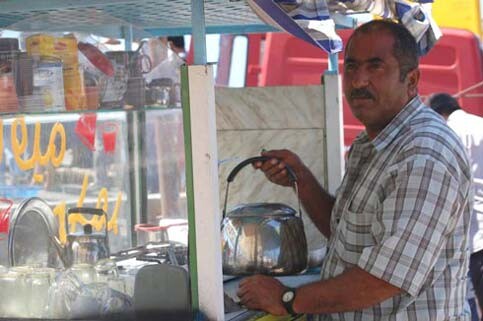
Mustapha Kobrosli
Age: 48
Address: Saida
Occupation: Fisherman
Interviewer: Mahmoud Zeidan
Q: What would you like to say?
A: Nothing, it’s just not new. We’ve seen Israel’s aggression before. In 1996 we went to fish, and the Israelis started shooting at us. The warship was shooting at us and bombing our net floats, and we lost our nets. They drowned them.
Q: How are you managing now to overcome these difficulties?
A: I used to borrow money from here and there, but now no one is able to lend me money anymore. So I decided to open this small caf� to get little money. Sorry to say it, but some of my friends pay me 500LL others can’t afford, they buy on credit. What is important to me is to get cost of bread.
Q: Do you think war is over?
A: War is over, but the blockade is not.
Q: How do you see the future?
A: We feel sorry because the UN Security Council has implemented Resolution 1701 from our side, but Israel hasn’t respected it. It refused to end the blockade. I hope the blockade will be over without affecting the negotiation on the captured soldiers. They shouldn’t be given for free.
Name of interviewee: Mohammad Abu Dakka
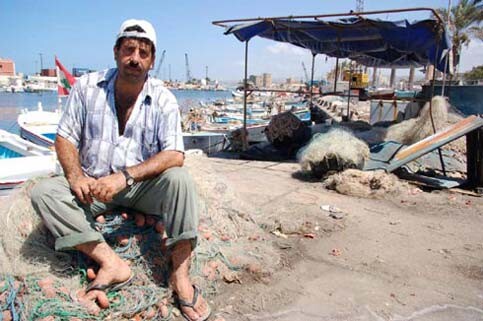
Mohammad Abu Dakka
Age: 44
Place of origin: Palestinian from Haifa
Occupation: Fisherman
Present address: Saida
Interviewer: Mahmoud Zeidan
Q: Tell me how were you affected by the blockade?
A: I was affected financially and psychologically. I have no money at all. Psychologically, I have two sons. They don’t want to stay in the country anymore. They want to immigrate now after they realized there is no safe area in Lebanon. My little daughters have a phobia. When they hear any bombs, they just hold in the arms of their mother and can’t move. As for work, there is nothing. Everything has stopped after the Israelis bombed all bridges. I went one month without any job.
Q: How are you managing?
A: Now some fishermen have started getting fish from Syria, so I started to clean the fish to survive.
Name of interviewee: Walid abd al Malak
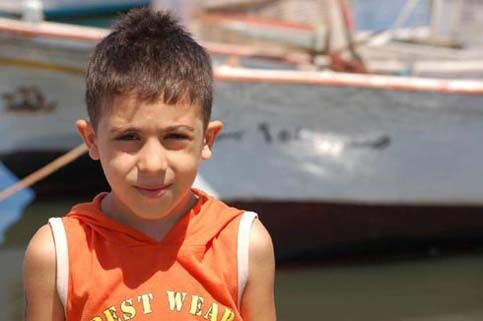
Walid abd al Malak
Age: 5
Place of origin: Palestinian from Germany
Present address: Saida
Interviewer: Mahmoud Zeidan
Q: What did you see during this vacation?
A: I saw planes bombing, and I saw dead children and broken houses.
Q: Were you afraid?
A: No.
Q: Which is better here or Germany?
A: Here.
Q: Why?
A: Because I play with children.
Name of interviewee: Mohamad al Masri
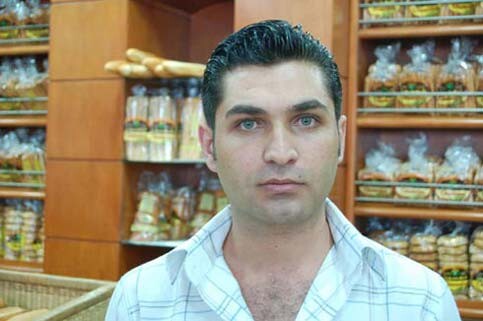
Mohamad al Masri
Age: 38
Present address: Tyre
Occupation: Sales Manager at Shimseen Bakery
Interviewer: Mahmoud Zeidan
Q: How did you deal with war?
A: The first week we kept working. After the first few weeks, people were running short of bread. They wanted to store bread especially when the Israeli’s bombed the roads. But we hadn’t stopped working. We were working under difficult conditions. The girls were coming and working at the bakery. They were standing behind the window glass even though it was so dangerous. Then there was no way to come here. Our staff couldn’t go anywhere or here to the bakery. As you know, they are human beings who get afraid and affected like others. This is why we closed. However, some other branches kept working.
Name of interviewee: Hala Shalhoub
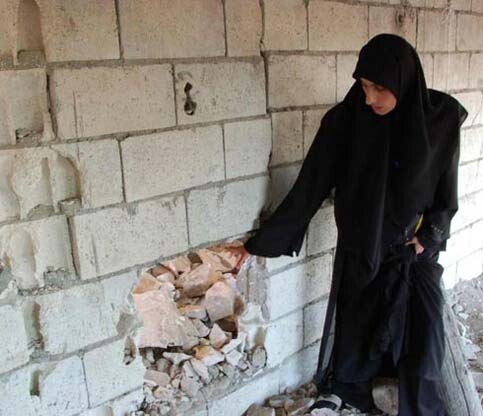
Hala Shalhoub
Age: 24
Present address: Qana
Interviewer: Mahmoud Zeidan
We were all sleeping together in this same building. We were very afraid. When we lit a candle, we used to cover it so that light wouldn’t escape to outside. We were sleeping and spending our day and night in this room. We stopped going out even to toilet. We made this small hole in the wall and used to sneak from it to relieve ourselces behind the wall.
When the Israeli fighter bombed us, I was buried under the rubble. I started shouting, but nobody heard me. I shouted again louder, then I started to swallow soil and rubble. I was about to choke. I thought I would be a martyr. But at last Haja Rabab heard me and saw my face. Then they withdrew me from under the rubble. My daughter, Zeinab (2 years) was buried in the rubble too, but not so deep. I think if the planes hadn’t prevented them to approach the building after the bomb, they could have saved her and she would have lived.
Name of interviewee: Maysarah Hamadeh
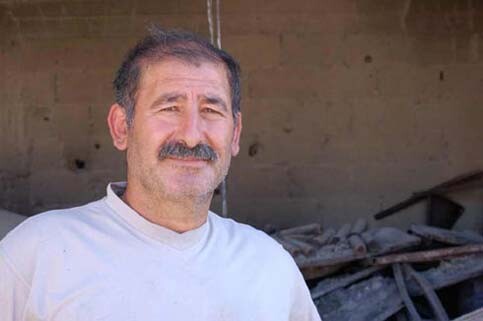
Maysarah Hamadeh
Age: 49
Present address: Qleileh
Occupation: Butcher
Interviewer: Mahmoud Zeidan
Q: Tell me how do you see the result of the war?
A: Nobody has won. It’s only destruction everywhere as you see.
Q: What did you do all this time?
A: I stayed home. Men stayed, but women and children left.
Q: Why hadn’t you left?
A: I have 40-50 cows, and I couldn’t leave them and go. We stayed till day 23 in the shelter. Israel started bombing the village and destroyed everything. I lost 3 butcheries. This one in front of you, I haven’t used. It cost me $40,000. They also destroyed the one I was working in. It cost me $40,000. It has two balances, and 4 Italian machines. It also has AC. The Israelis also bombed my new butchery on the costal road at Hinnyeh crossroad. That one cost $140,000. You don’t think it’s butchery. It’s like a bank, it has 6 AC’s, 4 fridges, a barbeque place, an electric generator that I bought for $10,000, a garden and a tent.
Q: How did you feel for this loss?
A: I felt I went backward. I went back to my old shop that I had started from. I was working there 26 years ago. I met the same old customers who were buying from my father. But (insha’a Allah) if with God’s will, in one month, I will repair everything and resume my work before Ramadan. Yesterday I went to Beirut and bought equipment for $20,000. Nobody loses but those who die. As long as you are alive, you can regain everything.
Lens on Lebanon is a grassroots documentary initiative formed in response to the devastating Israeli bombardment of 2006. We are pooling our resources to deliver film and video equipment into communities in south Lebanon, and to bring out documentary evidence as well as photo narratives, and video diaries of daily life under siege.
Related Links


